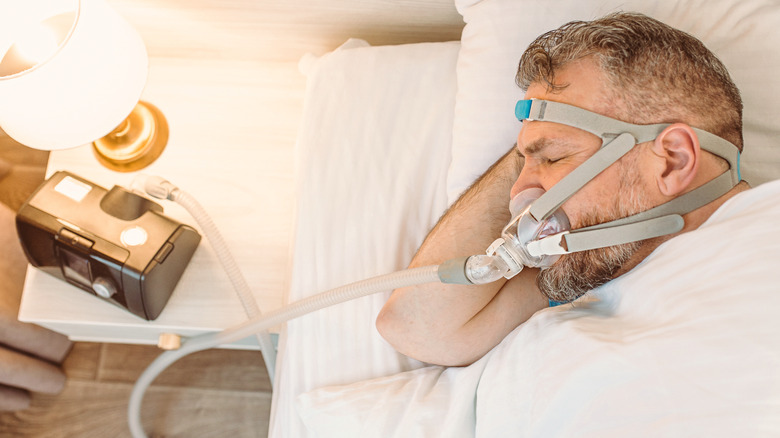Sleep apnea is a sleep disorder that affects your breathing, causing it to stop and start repeatedly. For many people, sleep apnea may involve a lot of snoring and being tired, despite a full night’s rest. According to Johns Hopkins Medicine, sleep apnea occurs as a result of the relaxation of your upper airway muscles while you sleep. When these muscles are relaxed, it “pinches” off your airway, pausing your breathing in the process. Breathing can stop for several seconds until your body’s reflexes take over again. This can result in you gasping for air, which can be a scary situation in the middle of the night.
There are 3 types of sleep apnea: obstructive sleep apnea, central sleep apnea, and complex sleep apnea syndrome. The most common type of sleep apnea is obstructive sleep apnea, according to the Mayo Clinic, which happens when muscles in the throat relax. Your body is trying to breathe, but air is unable to flow in or out of your mouth and nose. Although less common, central sleep apnea happens when the brain doesn’t send the right signals to help you start or control breathing.
Complex sleep apnea syndrome is a combination of obstructive sleep apnea and central sleep apnea. It occurs when someone has had obstructive sleep apnea that has turned into central sleep apnea from CPAP machine treatment or continuous positive airway pressure, Verywell Health explains.
How sleep apnea is treated

Treatment for sleep apnea is extremely important because the sleep disorder can result in serious complications if left untreated. According to WebMD, if you don’t treat sleep apnea, high blood pressure, a weakened immune system, and heart disease are only a few complications that can develop. When you have a sudden decrease in blood oxygen, it can lead to an increase in blood pressure or overexert your heart. If sleep apnea isn’t treated, it may lead to heart disease or strokes from those continuous drops in oxygen (via WebMD).
Sleep is important to your overall health because it gives your body the chance to reset for the next day. If your body is unable to recharge, your immune system weakens, meaning you may get sick more easily. If you want to reduce your risk of complications from sleep apnea, like heart disease, Healthline suggests losing weight. For some people, controlling or losing weight actually cures sleep apnea or makes it less severe, according to Johns Hopkins Medicine.
When you get enough sleep, you’re ensuring your body doesn’t experience a decrease in T cells. Lack of sleep can lead to the loss of those important blood cells, which help your body fight infections. There’s also the option of using a CPAP machine to give yourself more air while you sleep, but be sure to talk over the options with your doctor.




